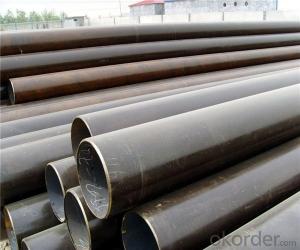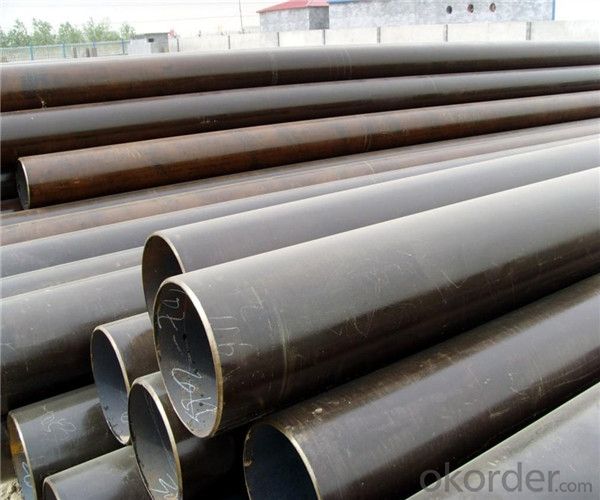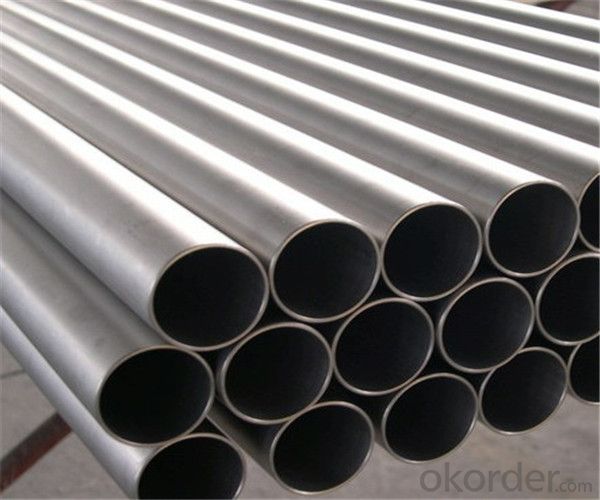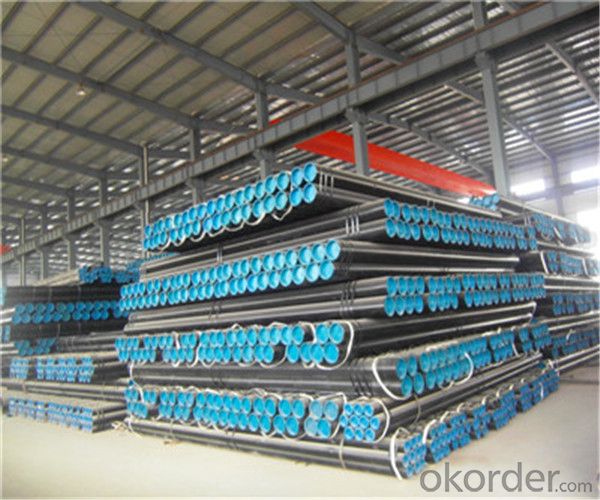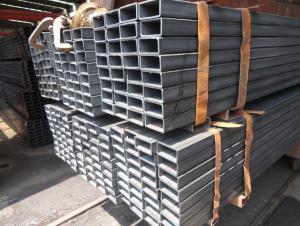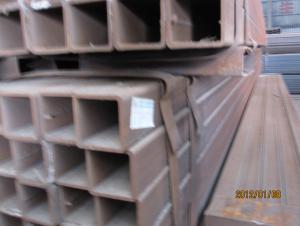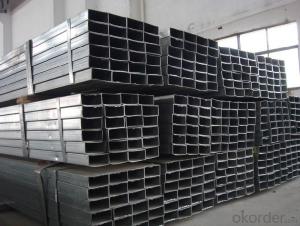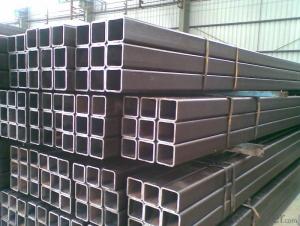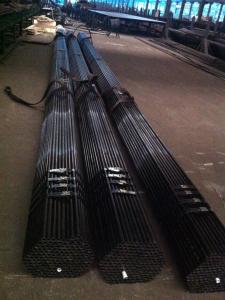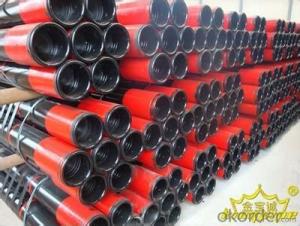Seamless Steel Pipe High Quality/Best Price
- Loading Port:
- Tianjin
- Payment Terms:
- TT OR LC
- Min Order Qty:
- 50 m.t.
- Supply Capability:
- 3000000 m.t./month
OKorder Service Pledge
OKorder Financial Service
You Might Also Like
PRODUCT DETAILS
1.Structure of Seamless Steel Pipe Description:
A large amount of Seamless Steel Pipes is offered to the clients at cost effective rates. These pipes are extremely durable, resistant to corrosion and have high tensile strength. Our pipes are used in nuclear plants, power plants, refineries and construction industry across the country. Furthermore, we are capable of providing these seamless pipes to the clients in bulk quantity.
2.Main Features of the Steel Pipe:
• High manufacturing accuracy
• High strength
• Small inertia resistance
• Strong heat dissipation ability
• Good visual effect
•Reasonable price
3.Seamless Steel Pipe Specification:
| Standard: | GB, DIN, ASTM,ASME, ASTM A106-2006, ASTM A53-2007 |
| Grade: | 10#,20#, 45#, 16Mn |
Thickness: | 8 - 33 mm |
| Section Shape: | Round |
| Outer Diameter: | 133 - 219 mm |
| Place of Origin: | Shandong, China (Mainland) |
| Secondary Or Not: | Non-secondary |
| Application: | Hydraulic Pipe |
| Technique: | Cold Drawn |
| Certification: | API |
| Surface Treatment: | factory state or painted black |
| Special Pipe: | API Pipe |
| Alloy Or Not: | Non-alloy |
| Length: | 5-12M |
| Outer Diameter: | 21.3-610mm |
5.FAQ of Seamless steel pipe:
①How is the quality of your products?
Our products are manufactured strictly according to national and internaional standard, and we take a test
on every pipe before delivered out. If you want see our quality certifications and all kinds of testing report, please just ask us for it.
Guaranteed: If products’ quality don’t accord to discription as we give or the promise before you place order, we promise 100% refund.
②How about price?
Yes, we are factory and be able to give you lowest price below market one, and we have a policy that “ for saving time and absolutely honest business attitude, we quote as lowest as possible for any customer, and discount can be given according to quantity”,if you like bargain and factory price is not low enough as you think, just don’t waste your time.Please trust the quotation we would give you, it is professional one.
③Why should you chose us?
Chose happens because of quality, then price, We can give you both.Additionally, we can also offer professional products inquiry, products knowledge train(for agents), smooth goods delivery, exellent customer solution proposals.Our service formula: good quality+good price+good service=customer’s trust.
SGS test is available, customer inspection before shipping is welcome, third party inspection is no problem.
Any question, pls feel free to contact us !
- Q: How do you clean steel pipes?
- To clean steel pipes, you can start by flushing them with water to remove any loose debris or dirt. Next, you can use a suitable cleaning solution specifically designed for steel pipes and apply it using a brush or sponge. Scrub the pipes thoroughly, paying attention to any stubborn stains or buildup. Rinse the pipes with water again to remove the cleaning solution, and finally, dry them thoroughly to prevent rusting.
- Q: Can steel pipes be used for underground heat exchange systems?
- Yes, steel pipes can be used for underground heat exchange systems. Steel is a durable and strong material that can withstand the pressure and environmental conditions typically found underground. It is resistant to corrosion and can handle high temperatures, making it suitable for transporting heat efficiently. Additionally, steel pipes are readily available and cost-effective compared to alternative materials, making them a popular choice for underground heat exchange systems. However, it is important to ensure proper insulation and protection of the steel pipes to prevent heat loss and damage from external factors such as moisture or soil movement.
- Q: What are the different types of steel pipe flanges?
- There are several types of steel pipe flanges, including slip-on flanges, weld neck flanges, socket weld flanges, threaded flanges, blind flanges, and lap joint flanges. Each type has unique features and is used in specific applications based on factors such as pressure ratings, pipe size, and end connections.
- Q: How are steel pipes protected from corrosion?
- Steel pipes are protected from corrosion through various methods such as applying protective coatings, using sacrificial anodes, or employing cathodic protection systems.
- Q: How are steel pipes connected to other materials like concrete or plastic?
- Steel pipes can be connected to other materials like concrete or plastic through various methods such as welding, flanges, threaded connections, or using specialized fittings. These connections ensure a secure and durable bond between the steel pipe and the other material, allowing for effective transfer of fluids or structural support.
- Q: What is the cost of steel pipes?
- The cost of steel pipes can vary depending on factors such as the size, grade, and quantity needed, as well as market conditions and supplier. It is recommended to contact suppliers or check online platforms to get specific pricing information.
- Q: Is the steel frame on each floor supporting formwork (floor) called full scaffolding?
- The use of scaffold as its height, when the ceiling height below 3.6M, no matter what the ceiling decoration, decorative scaffolding are calculated
- Q: How do steel pipes perform in seismic zones?
- Steel pipes perform well in seismic zones due to their high strength and ductility. They have the ability to absorb and distribute seismic energy, which helps in reducing the impact of earthquakes. Additionally, steel pipes are resistant to damage and deformation during seismic events, making them a reliable choice for infrastructure in earthquake-prone areas.
- Q: How are steel pipes used in the manufacturing of irrigation systems?
- Steel pipes are commonly used in the manufacturing of irrigation systems due to their durability, strength, and resistance to corrosion. These pipes are used to transport water from a water source to the fields or crops, ensuring a reliable and efficient irrigation process. The steel pipes also provide stability and support to the system, allowing for the proper distribution of water to the desired areas.
- Q: How are steel pipes used in the chemical processing industry?
- Steel pipes are used extensively in the chemical processing industry as they offer superior strength, durability, and resistance to corrosion. These pipes are used to transport various chemicals, including acids, alkalis, and solvents, throughout the processing plants. They are also utilized for conveying gases, steam, and liquids under high pressure and temperature conditions. Furthermore, steel pipes are employed in the construction of chemical reactors, heat exchangers, and storage tanks, ensuring the safe and efficient operation of chemical processes.
Send your message to us
Seamless Steel Pipe High Quality/Best Price
- Loading Port:
- Tianjin
- Payment Terms:
- TT OR LC
- Min Order Qty:
- 50 m.t.
- Supply Capability:
- 3000000 m.t./month
OKorder Service Pledge
OKorder Financial Service
Similar products
Hot products
Hot Searches
Related keywords
